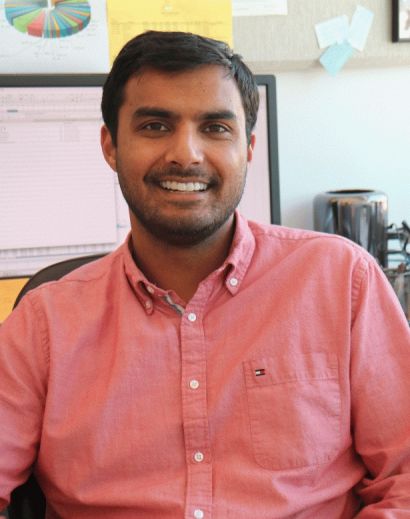- About
- Organization
- Organization Overview
- Dean’s Office
- Department of Bioengineering and Therapeutic Sciences
- Department of Clinical Pharmacy
- Department of Pharmaceutical Chemistry
- Quantitative Biosciences Institute
- Org Chart
- Research
- Education
- Patient Care
- People
- News
- Events
Checking in with Sourav Bandyopadhyay
Latest publications generate buzz
By Katherine Krebs / Fri Oct 26, 2018

Sourav Bandyopadhyay, PhD
Prof. Sourav Bandyopadhyay has been assiduous both in the laboratory and at his desk.
A couple of his recent papers have garnered much attention. One, “A Quantitative Chemotherapy Genetic Interaction Map Reveals Factors Associated with PARP Inhibitor Resistance,” identifies hundreds of potential new functional links between tumor mutations and responses to chemotherapy. This information could be used to select chemotherapeutics that are right for a particular patient, truly precision medicine.
Another, “Kinome Rewiring Reveals AURKA Limits PI3K-pathway Inhibitor Efficacy in Breast Cancer,” appears in Nature Chemical Biology.
This work is perhaps the most exciting to Bandyopadhyay. “We used an unbiased approach to map the activity of 100s of proteins at once to find the culprit causing drug resistance. The results are a testament to the power and real life potential of systems biology.”
Bandyopadhyay, born in Cincinnatti, OH, grew up in Rockford, IL and then went to University of Wisconsin, Madison for his undergraduate degree in Computer Science and Molecular Biology. From there, he briefly worked at a biotech startup, followed by a stint at the NIH as a research programmer. He began his PhD at UC San Diego in bioinformatics and systems biology
As a youth, Bandyopadhyay, was encouraged to study science by his family. He recalls this as “more of a push. Contrary to expectation, I was never a really good student in school. I think I was easily distracted and had too many interests, something that still plagues me to this day.
“Coming from an Asian household, you can imagine the friction this created with my parents. During the summers, boredom set in and I got into all sorts of trouble. My parents forced me, kicking and screaming, to volunteer in a local biology lab. Immediately I fell in love with lab life because I felt that I was actually contributing to discovering something new. It was so much more gratifying than doing homework! I’ve stuck with it ever since.”
Bandyopadhyay said he was drawn to UCSF by the highly collaborative environment here, plus the tremendous support for junior faculty. “My department is also fantastic, and I could see myself being happy there,” he added.
At the moment, Bandyopadhyay is working intensely on developing new therapies to counteract drug resistance in cancer. “The source of cancer drug resistance is remarkably diverse, from changes in cellular signaling, rare tumor subclones, and complex interactions between the tumor and the micro environment. We are developing new technologies to map the sources of drug resistance with the goal of developing new therapeutic approaches and starting clinical trials. Stay tuned!”
And perhaps the most thrilling aspect for Bandyopadhyay: “We've discovered a major new mechanism of resistance to cancer therapies through the activity of a new kinase normally thought to function only during mitosis. This kinase seems to be very important in resistance to genomically guided therapies in breast and lung cancer, and we are working to bring this forward in terms of new clinical trials. Our discovery was really guided by some of the earliest work in the lab and really driven by trainees. It’s been very gratifying.”
He loves the contact with cancer survivors and advocates: “The cancer center, breast oncology community, and the molecular tumor board have been great venues for me to learn about real clinical problems and interact with breast cancer survivors and advocates. These sorts of interactions are incredibly motivating and intellectually stimulating for me.”
Bandyopadhyay seems most inspired by his colleagues. “I am lucky to be in a place where many of my scientific heroes are also close collaborators. I draw inspiration from Kevan Shokat and Nevan Krogan about how dogmas can be broken and new approaches applied in creative ways to solve major biomedical problems.”
Tags
Category:
Sites:
Department of Bioengineering and Therapeutic Sciences
About the School: The UCSF School of Pharmacy aims to solve the most pressing health care problems and strives to ensure that each patient receives the safest, most effective treatments. Our discoveries seed the development of novel therapies, and our researchers consistently lead the nation in NIH funding. The School’s doctor of pharmacy (PharmD) degree program, with its unique emphasis on scientific thinking, prepares students to be critical thinkers and leaders in their field.



